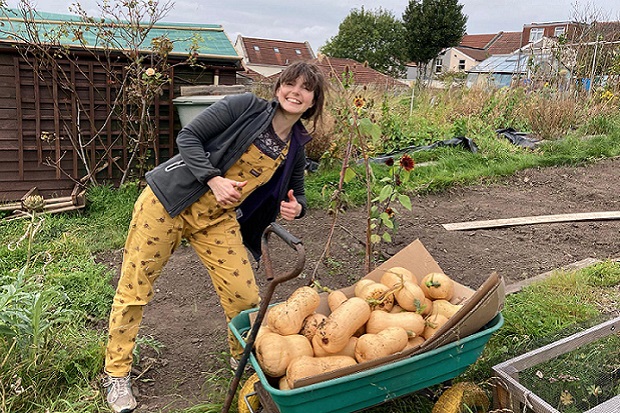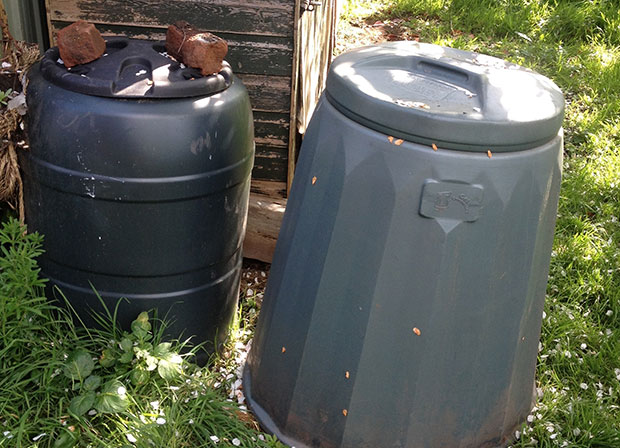
I work at Defra as a Senior Interaction Designer, and I have an interest in growing vegetables and cut flowers. I use composting as a big part of both waste management and as soil fertiliser.
Something I like about working at Defra is that I find lots of my interests outside of design, like agriculture, the environment, and waste management, crop up in the services I work on. I’ve also been really engaged in Defra and wider governments increasing focus on Planet Centred Design.
It’s an approach that really appeals to my values, and it’s with a planet-centred approach I’m often designing both within the services I work on at Defra, and outside of it in the garden and allotment - where I focus on re-use and responsible growing.
Design is my specialism, I’m not an expert in the sciences behind composting, or the different methods. For me composting has always been about garden waste management in largely improvised forms, which happen to produce a great fertiliser - just by nature doing its own thing. But for this post for #CompostWeekUk I thought I’d gather some research to share on the topic, alongside things I’ve seen or tried myself.
What is compost?
David Domoney explains it well in his post demystifying compost.
"The recycling of plant and kitchen waste as a fertiliser and soil amendment. Compost improves soil by returning organic matter to the soil and improves drainage and water retention."
According to BBC Gardening’s interesting facts, there are more micro-organisms in a teaspoonful of soil than there are humans alive on the planet!
Different ways to do it
There are a few different ways to compost:
- Use one of the many types of available manufactured composters
- Dig a hole for Trench Composting
- Form a mound to build a basic compost pile
- Sheet composting, also known as sheet mulching or lasagna gardening
- Make an enclosure out of pallets or old wood to use as an improvised composter
I use pretty much all of these options as I get through a lot of green waste, but my favourite ways to compost at the allotment are trench composting (for bean planting), and sheet composting on any large beds that don’t have winter crops on. These methods save having to move and apply the compost, as it’s just where it needs to be once it’s ready.
Benefits of composting
Here are just a few composting benefits:
- Waste solution for kitchen and garden waste
- A way to save food and plant waste from landfill for households who don’t have food waste or garden waste collections
- The compost when used as mulch improves drainage and water retention (reducing flooding), keeps the soil warmer, and feeds nutrients into the soil
What to do with it
There are plenty of uses for compost when growing outside, here are a few:
- Add nutrients to your garden by adding compost as mulch, into pots, baskets, planters, and beds
- Use as a mulch supply for No Dig gardening
- Use as a soil improver, mixing compost into soil in beds before sowing or planting
- Fertilize a lawn, using the compost as a natural fertilizer by adding an inch or two of compost to grass, and raking it in
- Make a compost tea for a liquid based natural fertilizer. Soak compost in water for a few days and strain it. The liquid can then be added to your watering can for extra nutrients when watering

If you don’t have an outside space, you can still use your compost:
- Improve the soil for your potted plants by mixing the compost with soil to add nutrients
- Compost tea, as mentioned above, can also be great for watering house plants
- Donate compost - to neighbours, local community groups, or school gardens, to contribute to your local outside spaces. You can also check for kerbside compost collections in your neighbourhood (some farmers markets also collect compost)
Hopefully I’ve given you some ideas on how to get composting, if you have the space to do so. Many, of course, don’t have much or any outside space, but some alternatives for space saving composting ideas are:
- Community compost schemes
- Space saving garden worm composting
- Composting jars/bottles (educational composting exercises for children)
And if composting isn’t your thing, many of the local authorities will collect food and garden waste from you. It can then either be turned into compost that then gets fed back into your local green spaces for you, or sent for anaerobic digestion to recycle nutrients into the soil whilst also generating energy.
Further information
Find out more about Compost Week UK.
We’re hiring all the time. Check out the latest Digital data and technology vacancies.
See more of our stories on LinkedIn.


1 comment
Comment by Alan Rider posted on
Great post Christina (plus your gardening outfit is a lot snazzier than mine!). My partner hated the idea of my getting a compost bin for our garden waste. Nasty smelly things she said. She was even more aghast when packages of live worms started arriving in the post to get it going! However, she has come to love those worms and their smelly home!